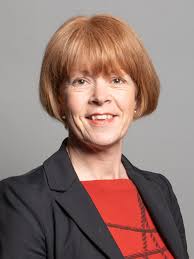Wendy Morton – 2022 Speech on Family Businesses
The speech made by Wendy Morton, the Conservative MP for Aldridge-Brownhills, in Westminster Hall, the House of Commons, on 20 December 2022.
I thank my hon. Friend the Member for Carlisle (John Stevenson) for bringing forward this debate. As he recognised in his opening speech, this debate is very timely. It is not often that we have debates on family business, and to do so at this time of year is a reminder of just how critical this time is for so many of those businesses.
I start by referring to my entry on the Register of Members’ Financial Interests. As many in this room will know, I have a background in family business. Prior to coming into this place—too many years ago to remember—my husband and I started a business with the enterprise allowance, when that was around, at £40 a week. Two things were critical in starting that business: one was the allowance, which, although it did not seem like a lot of money, meant a lot because we felt the Government were prepared to back us and the idea my husband had; the other, touching on the point made by the hon. Member for Strangford (Jim Shannon), was the importance of our relationship with the local bank. The relationship we had with our bank manager was absolutely 100%. If she had not been there, there were some days we would probably have struggled. She helped us to get through and see the light at the end of the tunnel. Although we often discuss banking and the role of banks in the community in this place, it is a reminder that the role of banks to businesses and the presence of a high-street branch and a named person that can be contacted really does make a difference.
Being back on the Back Benches, as the hon. Member for Strangford alluded to, I see an opportunity to make several points, but also to highlight some of the amazing family businesses across my constituency. Don’t worry, Mr Robertson; I am keeping an eye on the clock, and I will not take all of the time and will leave plenty of time for Front-Bench speakers. I want to mention some of those businesses because I want to further demonstrate the variety of small, family businesses not only in my constituency, but right across the country, and the way that they form the backbone of so many local economies. They make a massive contribution to the Exchequer, but also to our local communities.
Six years ago, I visited a business called Jennifer Ashe Funeral Directors that had just opened on Brownhills High Street. When I went back there this summer for a visit and tour, it was incredible to see how that business had grown over those six years. It is no longer just in Brownhills, but has many other locations. We talk about generations, and the next generation of the family is now involved as well.
We also talk a lot about high streets in this place. We talk about Small Business Saturday at the beginning of December, which is an opportunity for many of us to go out on to the high street and highlight local businesses and how important they are. I am reminded of another occasion, which is called Family Business Week; I see the Minister is nodding. Perhaps that is something we need to make more of and highlight in the same way to embrace what we have in our communities.
Our high streets have faced a difficult and challenging time, which started before covid. High-street businesses were hit throughout the pandemic as well, but many of them are now finding their feet again. In Aldridge, we have a fantastic florist—another family business—called Herbarium, which is run by Mike and Sue Soles. I walked past and popped my head round the door just last week. Christmas is a busy time for them, and it really matters that we go out and support our local businesses. I was equally pleased to see a florist called the Bloom Room open just a couple of weeks ago on Pelsall High Street. It is also run by a local lady who wants to invest in the local community and sees that the time is right to do that. I wish her all the best in her endeavours
The hospitality industry is another key part of this. As we heard from my hon. Friend the Member for Torbay (Kevin Foster), seaside resorts have lots of hospitality. However, hospitality is a sector with many examples of family-run businesses. The Fairlawns hotel, run by the Pette family—now on their second generation—was actually rated one of the top 25 family-run hotels in the country. I am also told that it was one of only six outside of London to make the Tripadvisor list. Again, that is another example of a fantastic family-run business.
As my hon. Friend the Member for Torbay started talking about fairgrounds, I thought it would be rather remiss of me not to almost go into competition with him by highlighting the breadth of family businesses across my constituency. Pat Collins Funfairs is a fascinating story because Pat Collins was a Liberal Member of Parliament and mayor of Walsall, but he is actually recognised and remembered more for Pat Collins Funfairs, which was founded in 1899.
The family business was established remarkably quickly and, within a decade, Pat Collins was a leading showman in the midlands, owning several steam-driven fairground rides. He also went on to be one of a group of showmen who met in Manchester to create the Showmen’s Guild of Great Britain. To this day, the business is still owned within the same family; it is owned by Anthony Harris and his family. Anthony is a Conservative local councillor on Walsall Council, and his father married one of Pat Collins’ granddaughters.
We can see how family businesses go down the generations. One reason for that is probably the way in which such businesses can focus on flexibility and resilience. They often do not need much support from Government or local councils, but they do need the space and the flexibility to grow and invest, and the right economic landscape for that.
I know from my own experience that someone with a small family business often does go that extra mile—not just them but their staff as well. People go that extra mile and put in that extra hour, because it is not just about thriving but sometimes just surviving to get through the difficult times and challenges and finding the opportunities and keeping on looking and moving forward.
My final namecheck for this morning must go to a local family-run business in High Heath. Harjit and Jodie Singh, known locally as H & Jodie, run what many would call a corner store, but it is much more than that. It is the Nisa Local, but they have set up a community hub there and have community days. Many of us will remember that this last summer was incredibly hot. It does not feel like it now—although perhaps it is in Westminster Hall—but if someone needed anything, the best place to go was often H & Jodie’s. If you could not find an electric fan anywhere in the locality, Mr Robertson, you could go to H & Jodie’s, where they would be stacked on the shelves. I give that example because it shows the flexibility and dynamism of small family businesses and how they really do go that extra mile by just getting on with the job.
I am a firm believer that a strong family-business base can really strengthen our communities. That builds up the local economy and then feeds into the national economy. Let us invest more in them. We talk a lot in this place about research and development, and about innovation. I completely get that. I also get the importance of Silicon Valley. We have manufacturers across Aldridge-Brownhills, including apprentice-supporting companies such as In-Comm, which invest in apprenticeships and developing skills for the future.
However, we also need the small businesses. Not everybody will be a scientist or a researcher. We need manufacturers and family businesses. Let us recognise their importance, because as my hon. Friend the Member for Carlisle set out, there are 14 million people employed across the sector, and it produces 44% of GDP. We do not talk about it enough; we do not give it 44% of the airtime when we are talking about businesses.
I would like to see us talk up our family businesses, because they really can play a key part in growing the economy. If we grow the economy, we can invest in our public services; if we grow our family businesses, they can invest in their business and their skills base, and that is what creates the jobs of the future.


